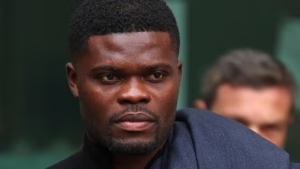The leader of a Florida-based neo-Nazi organization has been given a 20-year sentence in federal prison for collaborating with his girlfriend to orchestrate an attack on Maryland’s power grid, aiming to advance their shared bigoted ideologies.
Brandon Russell, a 30-year-old man, was found guilty by a jury earlier in the year. Lawyers from the prosecution provided evidence showcasing his long-standing involvement with white supremacist causes and his recent attempts to organize “sniper attacks” against electrical substations around Baltimore.
U.S. District Judge James Bredar strongly condemned Russell’s reprehensible views during a sentencing hearing in Baltimore federal court, claiming that Russell was the mastermind behind the operation, which aimed to cause societal collapse by targeting the energy infrastructure of a predominantly black city.
Following the projected attacks, Russell and his co-defendant, Sarah Beth Clendaniel, sought to “establish their own strange utopia, consisting of only individuals who shared their appearance and thought process,” according to Bredar.
“That’s not how it works,” the judge emphasized. “The law doesn’t allow for a change in course in this country through violent overthrows.”
Bredar sentenced Russell to the maximum punishment for conspiracy to damage an energy facility—as well as lifelong supervised release, including close surveillance of his electronic activities.
Bredar previously sentenced Clendaniel to 18 years in prison for her role in the scheme, saying that Russell should receive a longer sentence because he was more culpable and supplied the “intellectual strength” that drove the plot forward.
The pair was apprehended in February 2023—before they could execute their plans.
Throughout the trial, it was alleged that the intended strikes could have had a significant impact on Baltimore and inflicted nearly $70 million worth of damages on electrical transformers.
An FBI agent who interacted with Russell online while working undercover as a neo-Nazi testified about conversations where Russell advocated for attacks on power stations and power lines.
Russell’s attorney, Ian Goldstein, maintained that Clendaniel posed a more significant threat since she was attempting to obtain a firearm to shoot at electrical substations. Meanwhile, Russell was living in Florida with no plans to travel to Maryland, according to his attorney.
“For Mr. Russell, everything was just talk,” Goldstein informed the court.
He also noted Russell’s supportive family, with his mother claiming in court documents that she believed her son was attempting to fill the void left by an absent father. She added that some challenges surfaced after she relocated them to the Bahamas, where she has family.
“Brandon Russell is an educated young man who has served this country’s military,” his attorney noted, linking his involvement with nazism to long-standing mental health challenges. “His family relationships speak volumes about the person he can be.”
The judge acknowledged Russell’s “somewhat problematic psychologically history” and advised mental health treatment during his incarceration.
Russell chose not to address the judge personally. He attended the court session wearing maroon prison attire and showed no apparent signs of emotion throughout the hearing.
Several years ago, Russell helped establish the neo-Nazi group Atomwaffen Division, which translates to “atomic weapon” in German. The guerrilla group was linked to five murders and various bomb plots but was dismantled by federal agents in 2020.
Prosecutors in California stated that a man found guilty of stabbing Blaze Bernstein, a gay Jewish university student, in a hate crime had ties to the Atomwaffen Division.
Russell’s trial shed light on the Biden administration’s efforts to combat violent right-wing extremism, as previously reported by the Guardian. Current and former state department officials have expressed concerns that the Trump administration downplayed threats from far-right and white supremacist violence.
This wasn’t Russell’s initial encounter with law enforcement. In 2017, police responded to a double homicide at a Tampa apartment complex and found Russell outside in a state of distress, wearing military gear. One of his roommates had killed the other two, officials claimed. During a search of the house, authorities discovered a stockpile of highly explosive materials and a collection of neo-Nazi signs, posters, books, and flags. Russell pleaded guilty to owning an unregistered destructive device and improperly storing explosives.
Source: https://www.theguardian.com/us-news/2025/aug/08/neo-nazi-leader-sentenced-to-20-years-for-plot-to-attack-marylands-power-grid







